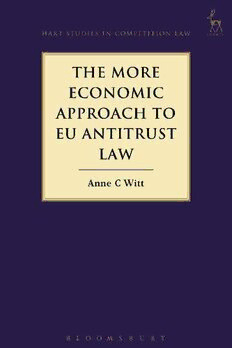Download The More Economic Approach to EU Antitrust Law PDF Free - Full Version
Download The More Economic Approach to EU Antitrust Law by Anne C Witt in PDF format completely FREE. No registration required, no payment needed. Get instant access to this valuable resource on PDFdrive.to!
About The More Economic Approach to EU Antitrust Law
In the late 1990s, the European Commission embarked on a long process of introducing a ‘more economic approach’ to EU antitrust law. One by one, it reviewed its approach to all three pillars of EU antitrust law, starting with Article 101 TFEU, moving on to EU merger control and concluding the process with Article 102 TFEU. Its aim was to make EU antitrust law more compatible with contemporary economic thinking.On the basis of an extensive empirical analysis of the Commission’s main enforcement tools, this book establishes the actual changes that the more economic approach has made to the Commission’s enforcement practice over the past 15 years. It demonstrates that the new approach not only introduced modern economic assessment tools to the Commission’s analyses, but fundamentally changed the Commission’s interpretation of the law. Emulating one of the key credos of the US Antitrust Revolution 30 years earlier, the Commission reinterpreted the EU antitrust rules as aiming at the enhancement of economic consumer welfare only, and amended its understanding of key legal concepts accordingly.This book argues that the Commission’s new understanding of the law has many benefits. Its key principles are logical, translate into workable legal concepts and promise a great degree of accuracy. However, it also has a number of serious drawbacks as it stands. In particular, the Commission’s review of Article 102 has yielded unsatisfactory results. Moreover, its revised interpretation of the law is largely incompatible with the case law of the Court of Justice of the European Union, which has not been swayed by the exclusive consumer welfare aim. This situation is undesirable from the point of view of legal certainty and the rule of law.Volume 14 in the series Hart Studies in Competition Law
Detailed Information
| Author: | Anne C Witt |
|---|---|
| Publication Year: | 2016 |
| ISBN: | 9781509909230 |
| Pages: | 379 |
| Language: | English |
| File Size: | 3.035 |
| Format: | |
| Price: | FREE |
Safe & Secure Download - No registration required
Why Choose PDFdrive for Your Free The More Economic Approach to EU Antitrust Law Download?
- 100% Free: No hidden fees or subscriptions required for one book every day.
- No Registration: Immediate access is available without creating accounts for one book every day.
- Safe and Secure: Clean downloads without malware or viruses
- Multiple Formats: PDF, MOBI, Mpub,... optimized for all devices
- Educational Resource: Supporting knowledge sharing and learning
Frequently Asked Questions
Is it really free to download The More Economic Approach to EU Antitrust Law PDF?
Yes, on https://PDFdrive.to you can download The More Economic Approach to EU Antitrust Law by Anne C Witt completely free. We don't require any payment, subscription, or registration to access this PDF file. For 3 books every day.
How can I read The More Economic Approach to EU Antitrust Law on my mobile device?
After downloading The More Economic Approach to EU Antitrust Law PDF, you can open it with any PDF reader app on your phone or tablet. We recommend using Adobe Acrobat Reader, Apple Books, or Google Play Books for the best reading experience.
Is this the full version of The More Economic Approach to EU Antitrust Law?
Yes, this is the complete PDF version of The More Economic Approach to EU Antitrust Law by Anne C Witt. You will be able to read the entire content as in the printed version without missing any pages.
Is it legal to download The More Economic Approach to EU Antitrust Law PDF for free?
https://PDFdrive.to provides links to free educational resources available online. We do not store any files on our servers. Please be aware of copyright laws in your country before downloading.
The materials shared are intended for research, educational, and personal use in accordance with fair use principles.

